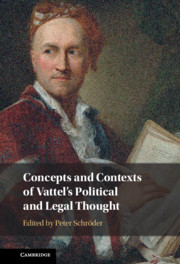Book contents
- Concepts and Contexts of Vattel’s Political and Legal Thought
- Concepts and Contexts of Vattel’s Political and Legal Thought
- Copyright page
- Contents
- Contributors
- Acknowledgements
- Concepts and Contexts of Vattel’s Political and Legal Thought
- Part I Historical and Intellectual Contexts
- Part II Concepts
- Part III Receptions
- 10 Vattel’s Reception in British America, 1761–1775
- 11 Tradition and Revolution
- 12 Vattel’s Law of Nations in Late Eighteenth- and Early Nineteenth-Century Greece and Italy
- 13 Reception of Vattel in Eighteenth- and Early Nineteenth-Century England and Scotland
- 14 Receptions of Vattel in Nineteenth- and Twentieth-Century International Law
- 15 Vattel’s Reception in International Relations
- Index
- References
11 - Tradition and Revolution
Eighteenth-Century German and French Contexts and Vattel’s Law of Nations
from Part III - Receptions
Published online by Cambridge University Press: 11 June 2021
- Concepts and Contexts of Vattel’s Political and Legal Thought
- Concepts and Contexts of Vattel’s Political and Legal Thought
- Copyright page
- Contents
- Contributors
- Acknowledgements
- Concepts and Contexts of Vattel’s Political and Legal Thought
- Part I Historical and Intellectual Contexts
- Part II Concepts
- Part III Receptions
- 10 Vattel’s Reception in British America, 1761–1775
- 11 Tradition and Revolution
- 12 Vattel’s Law of Nations in Late Eighteenth- and Early Nineteenth-Century Greece and Italy
- 13 Reception of Vattel in Eighteenth- and Early Nineteenth-Century England and Scotland
- 14 Receptions of Vattel in Nineteenth- and Twentieth-Century International Law
- 15 Vattel’s Reception in International Relations
- Index
- References
Summary
The present chapter focuses on the Law of Nations (1758) and its relation to the political tradition and to modern ideas of constitution and nation – taking Germany and France as objects of study. On the one hand, it takes up Vattel’s interpretation of the structure of the Holy Roman Empire and the threat posed by Frederick II to the society of nations; on the other, it focuses on elective affinities, examining the correspondence between certain of Vattel’s ideas and the new constitutional doctrines in revolutionary France. These are two strikingly different contexts. The first perhaps best represents the pinnacle of the early modern princely territorial state, albeit clothed in the ideas of the Enlightenment. By contrast, the second is nothing other than the dramatic destruction of the ancien régime – establishing a new constitution and idea of the nation.
- Type
- Chapter
- Information
- Concepts and Contexts of Vattel's Political and Legal Thought , pp. 220 - 238Publisher: Cambridge University PressPrint publication year: 2021



